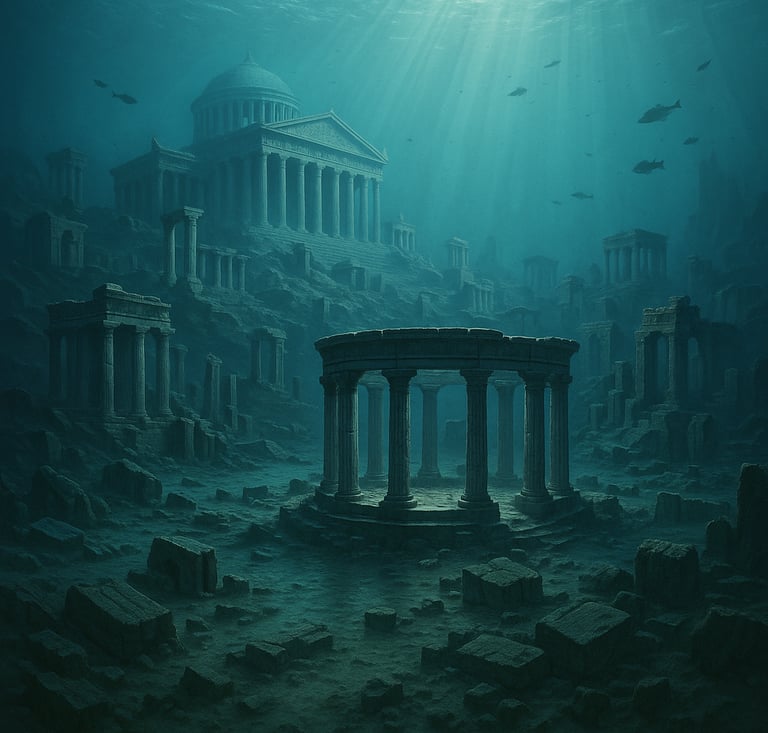𝗔𝗧𝗟𝗔𝗡𝗧𝗜𝗦: 𝗧𝗛𝗘 𝗟𝗢𝗦𝗧 𝗖𝗜𝗧𝗬
𝗔𝗧𝗟𝗔𝗡𝗧𝗜𝗦: 𝗧𝗛𝗘 𝗟𝗢𝗦𝗧 𝗖𝗜𝗧𝗬
MYSTERIES & ARCHAEOLOGY
MrTruth.Tv
12/10/20257 min read
Introduction
For more than two millennia, the legend of Atlantis has captivated the imagination of philosophers, historians, writers—and ordinary people drawn to mysteries of lost civilizations. First described by the Greek philosopher Plato in his dialogues Timaeus and Critias, Atlantis is depicted as a powerful island empire that existed “about 9,000 years before Solon” and which, because of hubris, fell out of favor with the gods and was swallowed by the sea. HISTORY+2Wikipedia+2
Despite its long shadow over literature and culture, few scholars believe that Atlantis was a real place in the manner those myths describe. Yet the question remains: is there any historical or geological foundation to the story? This article examines the sources of Atlantis, the various interpretations of its meaning, the evidence for and against its historicity, and why the myth endures into the 21st century.
Plato’s Primary Account: Timaeus and Critias
The only ancient works that detail Atlantis are Plato’s dialogues Timaeus (written around 360 BCE) and Critias. In Timaeus, Atlantis is introduced as an island beyond the “Pillars of Hercules” (commonly identified with the Strait of Gibraltar) that once existed in the Atlantic Ocean and was larger than “Libya and Asia Minor” combined. Wikipedia+2Encyclopedia Britannica+2 According to the tradition, Solomon the lawgiver (Solon) visited Egypt, where priests in the city of Sais told him of Atlantis’s story, preserved in Egyptian records. Solon then brought versions of the story back to Greece; eventually, Plato uses this tale as a backdrop in Critias to contrast ideal Athens with Atlantis. Encyclopedia Britannica+2ThoughtCo+2
In Critias, more details are provided: Atlantis was ruled by Poseidon, who fathered children with a mortal woman, Cleito. Their descendants became the kings of Atlantis. The island’s capital featured concentric rings of land and water, grand palaces, rich agriculture, irrigation systems, and formidable fortifications. Yet despite its splendor, Atlantis grew morally corrupt, and it attempted to invade “Europe and Asia.” The Athenians resisted and defeated them. Finally, in a single disastrous event – earthquakes, floods – Atlantis sank beneath the waves.
It is also significant that Critias is incomplete; Plato never finished the dialogue, and the full outcome of certain events is not preserved. Penn Museum+1
The Nature of Plato’s Account: Myth, Allegory, or History?
Given that Plato is the sole ancient source for the detailed story, scholarship divides on how to interpret Atlantis.
As philosophical allegory. Many scholars believe Plato invented Atlantis or used partial imaginative fiction in order to illustrate moral, political, or ethical themes: the dangers of hubris, decay of civilization, the contrast between the just city and tyrannical might. The Atlantis story can be seen as part of Plato’s broader philosophical project—such as found in Republic—where he explores what justice, virtue, ideal states look like. ThoughtCo+2Encyclopedia Britannica+2
As a syncretic myth drawing on older traditions. Some interpretations hold that Plato drew from older Egyptian, Near Eastern, or Minoan legends, natural disasters, or oral tradition to compose a story that sounded plausible (to his contemporaries) though not literally true.
As historical kernel plus exaggeration. There are those who suggest that behind Atlantis lies some real event—volcanic eruptions, tsunamis, floods, or the destruction of Bronze Age civilizations such as the Minoans—that inspired or informed the myth, even though Plato’s description is impossible to match to any known geography or archaeological record. MDPI+2Encyclopedia Britannica+2
Key Theories on the Possible Inspiration / Location
Over centuries, people have proposed many candidate locations and sources that could align with Plato’s description or with later understandings of Atlantis. Below are some of the main hypotheses, along with their strengths and challenges.
Dating Problems and Chronology
One of the most persistent issues in Atlantis studies is chronology. Plato states that Atlantis existed roughly 9,000 years before the time of Solon; scholars generally place Solon around 590–580 BCE. That would set Atlantis’s prime around 9500 BCE.
Archaeologically, 9500 BCE is a very early period—toward the end of the Pleistocene and the beginning of the Holocene, long before the rise of large-scale civilizations or widespread agriculture in many places. Human societies at that time were transitioning from hunter-gatherer to early settled life in some regions, but there is no evidence of advanced metallurgy, urban planning, or monumental architecture that Plato describes.
Some researchers suggest that the date may be symbolic or exaggerated, copied incorrectly, or that Plato meant a much more recent event but transformed it into a highly remote past to give it weight. Or perhaps Solon misheard, mis-translated or was told an oral tradition with distorted chronology.
Geological, Archaeological, and Environmental Evidence
If Atlantis had been a real island civilization with the described features, one would expect to see traces in the geological and archaeological record. To date, however:
No confirmed archaeological site matches all the features Plato attributes to Atlantis. Features such as concentric rings of land and water, large armies, grand palaces, etc., are not corroborated by a single discovered site that also fulfills the location criteria beyond the Pillars of Hercules.
Natural disaster analogues do exist: for example, the eruption of Thera (Santorini), which triggered tsunamis and may have severely disrupted Minoan civilization. Also, flood myths are widespread. Some scholars see in these events possibly the seed of Plato’s story. HISTORY+1
Sea-level changes and submerged lands do show that coastlines have shifted; land bridges have submerged in many places; dramatic climate changes occurred during the end of the ice age. Yet none clearly map to the Atlantis description.
Limitations in evidence: much of the eastern Atlantic and Mediterranean has been studied geologically and archaeologically, yet no Atlantis-scale remains have been found. Also, Plato’s narrative includes elements (divine intervention, gods, legendary distances, etc.) that do not align cleanly with naturalistic, scientific reconstruction. Locations described in myth may have been changed over time; translation, transmission, loss of records all make it hard to pin down.
Interpretations Through History
Atlantis has had many lives in the world’s intellectual, cultural, and even political imagination:
Classical Antiquity and Early Thought: While Plato’s texts circulated, it is not clear how many of his contemporaries believed in Atlantis as actual history. Some seem to have treated it allegorically; others possibly more literally.
Renaissance to 19th Century: The myth was revived, often treated as fact. Cartographers, explorers, writers speculated on its location; some equated it with the Americas, other unknown lands. In the 19th century, Ignatius Donnelly’s Atlantis: The Antediluvian World (1882) argued for a real Atlantis that influenced all ancient civilizations. Wikipedia+1
20th and 21st Centuries: As archaeology became increasingly scientific, the weight of evidence tilted heavily toward viewing Atlantis as myth or allegory. Modern scholarship tends to treat the story as one of Plato’s many philosophical myths, possibly rooted in or inspired by real events, but not literally true. Publications such as National Geographic and others have critically examined the myth, reviewing geological and archaeological data. National Geographic+2Penn Museum+2
Popular Culture: Atlantis is ubiquitous in literature, film, fantasy, occult or New Age literature, pseudoarchaeology, conspiracy theories. Its enduring popularity rests in part on human fascination with “lost worlds,” the idea that some ancient wisdom / civilization was more advanced than we know, or the romantic longing for a utopia.
Scholarly Consensus and Criticism
Given all of the above, what is the current academic consensus?
Most classical scholars and historians believe that Atlantis, as described by Plato, is fictional or allegorical. There is no solid archaeological or geological evidence that matches the full depiction.
Those who argue for a historical basis for the myth generally admit significant gaps and speculative leaps. They often rely on partial matches: for example, the Minoan civilization’s destruction via volcanic eruption, possible flood myths, submerged coasts, etc. None has yet satisfied all criteria.
Critics also point out logical inconsistencies in Plato’s description (such as distances, the scale of size, implausible architecture, or transport), contradictions with known historical or environmental data, and anachronisms.
Some fringe or pseudo‐scientific claims persist—Atlantis as civilization with advanced technology, or an ancient global empire—but mainstream academia treats these with high skepticism, given lack of evidence.
Why the Myth Endures
If Atlantis is almost certainly not a historical empire matching Plato’s full description, why does the story continue to grip so many? Several factors help explain its staying power.
Mythic resonance. Atlantis taps deep human themes—hubris, loss, catastrophe, moral decline, ideal societies, utopia vs dystopia. These are universal narratives that transcend cultures and eras.
Mystery and imagination. The unknown appeals. The idea of a lost civilization evokes wonder: what if there was something more, hidden beneath the waves, lost to time?
Pseudo‐evidence and speculative possibilities. The gaps in archaeological knowledge, shifts in geology, discoveries of ancient catastrophes—all give space for speculation. When definitive proof is lacking, people fill the vacuum with hypothesis, “what if’s,” conspiracy, or fantasy.
Cultural reuse. Atlantis functions as metaphor in literature, art, politics. Utopias, lost ideals, warnings against moral decay—the myth is reusable. Plato himself used it for precisely those sorts of lessons. Popular culture (film, books, video games) keeps reinventing it, sometimes divorcing it entirely from its Greek roots.
Desire for origins. For many, the myth suggests perhaps earlier knowledge, advanced civilizations, or roots erased by time. This holds appeal especially where there are perceived gaps in recorded history.
Recent Research and New Angles
Some of the latest scholarly work attempts to nuance the discussion further rather than insisting strictly “real vs myth.”
A 2019 study in Heritage (an academic journal) explored the idea that “Atlantis” in Plato’s narrative may symbolically refer to the land of origin of Egyptian god-founders, interpreting certain mythic elements in light of Egyptian belief, mythic time, and the context of floods and natural disasters.
Geological and climatic research continues to document big shifts during the end of the last Ice Age, including sea level rises, earthquakes, tsunamis, regional flooding—offering plausible real world phenomena that might have inspired parts of the myth.
Investigations into the written sources (how Plato may have heard or shaped Solon’s retelling of Egyptian priests, oral tradition, memory distortion) remain important in classical studies. Some scholars look at transmission, textual analysis, possible mistranslations or exaggerations over time.
Comparative mythology and myth studies continue to explore similarities between Atlantis myth and other flood myths, lost world tales, or narratives of cataclysms in many ancient cultures.
Conclusion
Atlantis remains, in academic terms, a powerful myth more than a proven historical place. The only ancient source of the detailed story is Plato, and there is no uncontested archaeological or geological evidence that matches the scale, location, or nature of Atlantis as he describes it. Yet the myth is not without value. It reveals much about ancient Greek thought (particularly Plato’s), about how humans imagine their past, how memory and myth can coexist with knowledge and science, and how stories persist.
In short, Atlantis may not be a lost city in a literal sense, but it is a founding myth for countless imaginations—as real in its influence as many physical empires once was, though likely never was the place at the bottom of the sea.
References
Plato. Timaeus and Critias. (Circa 360 BCE).
“Atlantis.” Encyclopaedia Britannica. Encyclopedia Britannica
Gill, N.S. “Atlantis as It Was Told in Plato’s Socratic Dialogues.” ThoughtCo, Updated Sept. 14, 2024. ThoughtCo
Pruitt, Sarah. “Was Atlantis Real? 6 Theories About the Lost Civilization.” History.com, March 10, 2025. HISTORY
Rapisarda, M. “Atlantis: A Grain of Truth Behind the Fiction?” Heritage, 2019. MDPI
Krebsbach, Jared, PhD. “The Legend of Plato’s Atlantis, Inside the Mythical City.” The Collector, July 3, 2025. TheCollector
“Why the myth of Atlantis just won’t die.” National Geographic, 2023.
“Atlantis, Carli and Bailly, and a short discussion about ‘demonstration’ in cultural astronomy.” Elio Antonello, arXiv preprint, Sept. 2016. arXiv



